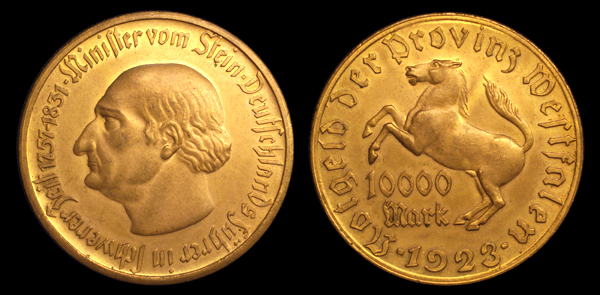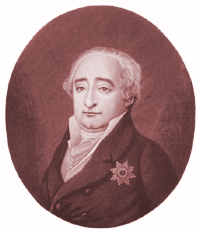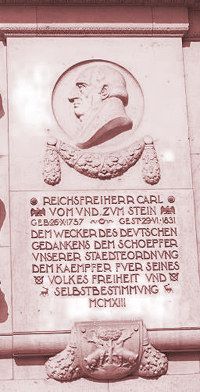
WESTFALEN (GERMAN) 10000 MARKS 1923
F- 645.7b Westfalen (German) 10000 Mark Notgeld Coin Depicting Baron Heinrich Friedrich Karl Von Stein.
|
Heinrich Friedrich Karl Reichsfreiherr vom und zum Stein (Baron Karl Stein) was born on October 26, 1757, the ninth child of Karl Philipp, Freiherr vom Stein, and Henriette Karoline Langwerth von Simmern. His family were noble land owners belonging to the order of imperial knights of the Holy Roman Empire. About his childhood he would later comment: "My view of the world and of human affairs I gathered as a boy and youth, in the solitude of a country life, from ancient and modern history, and in particular I was attracted by the incidents of the eventful history of England." He did not receive a formal education but as a teen he was sent to the University of Göttingen in Hanover to study jurisprudence under a private tutor. Here he was also able to continue his study of English history and politics. In 1777 he left Göttingen and traveled to Wetzlar, the legal centre of the Holy Roman Empire, to observe the inner workings of the courts and to prepare for a career in law. He then traveled to Regensburg in order to observe the methods of the Imperial Diet and from there to Vienna in 1779, eventually arriving in Berlin in 1780 where he began his life of public service under Frederick the Great (whom he greatly admired) in the department of mines and manufactures. Here he worked under the able and intelligent administrator Friedrich Anton von Heynitz who helped him to master the principles of economics and civil government. In 1785 he served a brief stint as Prussian ambassador to the courts of Mainz, Zweibrücken and Darmstadt. The blunt, matter-of-fact Stein found he lacked the patience and delicacy in temperament required and quickly developed a distaste for diplomacy. In 1786-1787 he fulfilled his wish to tour England where he furthered his researches into commercial and mining affairs. By November 1787 he had returned and was appointed director of the board of war and domains for the king's possessions west of the river Weser until he was appointed supreme president of all the Westphalian chambers dealing with commerce in 1796. In 1793 Stein married the Countess Wilhelmine von Wallmoden, daughter of Field Marshal Count Ludwig von Wallmoden-Gimborn, son of King George II of Great Britain. Prussia had had been at war with France for a year by this time and the war would continue on until peace was negotiated at Basel in April 1795 though other German states and Austria would continue to fight. In 1797 the ineffectual and extravagant Friedrich Wilhelm II died, leaving the state in bankruptcy and confusion, the army decayed and the monarchy discredited. He was succeeded by his son Friedrich Wilhelm III who was equally ineffectual and perceived as being soft for pursuing a policy of neutrality in the Napoleonic Wars. It was under these circumstances that Stein became the minister of state for trade in 1804. He protested against what he felt were pro-French influences within the court that led to a policy of perceived subservience to France to no avail until Napoleon's provocations ultimately forced Friedrich Wilhelm back into war against the aggressive French forces in 1806. In that year, at the Battle of Jena-Auerstädt, the French defeated the Prussian army led by the King, and the Prussian army collapsed. The royal family fled to East Prussia and was given refuge by Alexander I of Russia. Alexander would also suffer defeat at the hands of the French. Eventually France made peace with Prussia under extremely unfavorable terms in which Prussia lost all its Polish territories as well as all territory west of the Elbe, and had to pay for French troops to occupy the Kingdom. With the government in disarray the king then offered Stein the portfolio for foreign affairs which he declined suggesting instead Karl August von Hardenberg for the position. The king refused to accept Hardenberg and was greatly irritated by Stein's unusually outspoken letters regarding the matter causing him to dismiss Stein from his position. The King eventually did appoint Hardenberg only to see him resign during negotiation with Napoleon who eventually refused to deal with him. Oddly Napoleon himself suggested Stein as his replacement and, on October 8, 1807, Frederick Wilhelm essentially gave Stein sweeping, almost dictatorial, powers over the nearly bankrupt Prussian state which allowed him the freedom to institute sweeping reforms virtually unopposed. He issued the Edict of Emancipation in 1807 abolishing serfdom throughout Prussia and eliminating rigid class distinctions respecting occupations. He also instituted the principle of free trade in land without class restrictions. He reformed the cabinet and aided Gerhard Johann David von Scharnhorst in instituting much needed military reforms, modernizing the Prussian army with a reserve system. His reforms touched almost every aspect of Prussian society and government including municipal reform which granted local self-government to all Prussian towns and villages possessing more than 800 inhabitants. Stein was forced to flee Prussia in 1808 when French agents intercepted one of his letters in which he spoke of his hope that a united Germany would soon rise up and expel the French occupation. Napoleon ordered Stein's property in Westphalia to be confiscated and pressured Friedrich Wilhelm to dismiss him. The king evaded compliance to no avail as Napoleon declared Stein to be an enemy of France and the Confederation of the Rhine forcing Stein to flee to Bohemia with the help of his friend, Count Friedrich Wilhelm Graf von Reden. In 1812 he received an invitation from the Emperor Alexander I to visit Saint Petersburg as France, German and Austrian states prepared for an invasion of Russia. After a disastrous campaign, the French and allied forces were thoroughly defeated by the tenacious Russian army and forced to retreat. Stein urged the Russian Emperor to continue into Europe and press his advantage as the French led coalition was in shambles. On December 30, 1812 the Prussian general Hans David Ludwig Yorck von Wartenburg signed the Convention of Tauroggen with the Russian general Hans Karl von Diebitsch for neutralization of the Prussian corps granting free passage of Russian troops through the kingdom to bring the fight to France and its German and Austrian allies. Alexander requested Stein to be appointed as provisional administrator of the provinces of East and West Prussia. Accepting this position Stein convened an assembly of representatives which on February 5, 1813 ordered the establishment of a militia. Although these actions were commonly well received, they were not met well by Frederick Wilhelm and he was alienated by the king and his court who began to see Stein as a fanatic. All the same, the Treaty of Kalisch, an agreement between Russia and Prussia to oppose Napoleon was signed and after a brief illness Stein recovered in time to take part in the drafting of the Russo-Prussian pact in March 1813 which began the campaign to free Prussia from French rule. Eventually England and Austria joined the the coalition and conferred on Stein the position of administrator of the liberated territories. After the Battle of Leipzig also known as the Battle of the Nations where Napoleon suffered one of his greatest defeats, Stein entered the city saying: "There it lies, then, the monstrous fabric cemented by the blood and tears of so many millions and reared by an insane and accursed tyranny. From one end of Germany to the other we may venture to say aloud that Napoleon is a villain and the enemy of the human race." He wanted to see Germany reconstituted as a nation as well as the annexation of Saxony but he would not see this come to pass. Frustrated by opposition and the postponement of the representative system of government which Friedrich Wilhelm had promised to Prussia in May 1815. He retired after the Congress of Vienna in 1815 to spend the reminder of his life engaged in the study history which had been a life long passion establishing the Society for the Encouragement of Historical Research and the publication Monumenta Germaniae Historica. Stein died at Cappenberg in Westphalia on June 29, 1831 at the age of 74. He is remembered as a highly intelligent, practical man of stern and irritable temperament, admired for his major role in originating many far-reaching progressive reforms of government and German society. He is also remembered for his tireless efforts to oppose the aggression of Napoleon and his roll in freeing the German states from French domination. |


